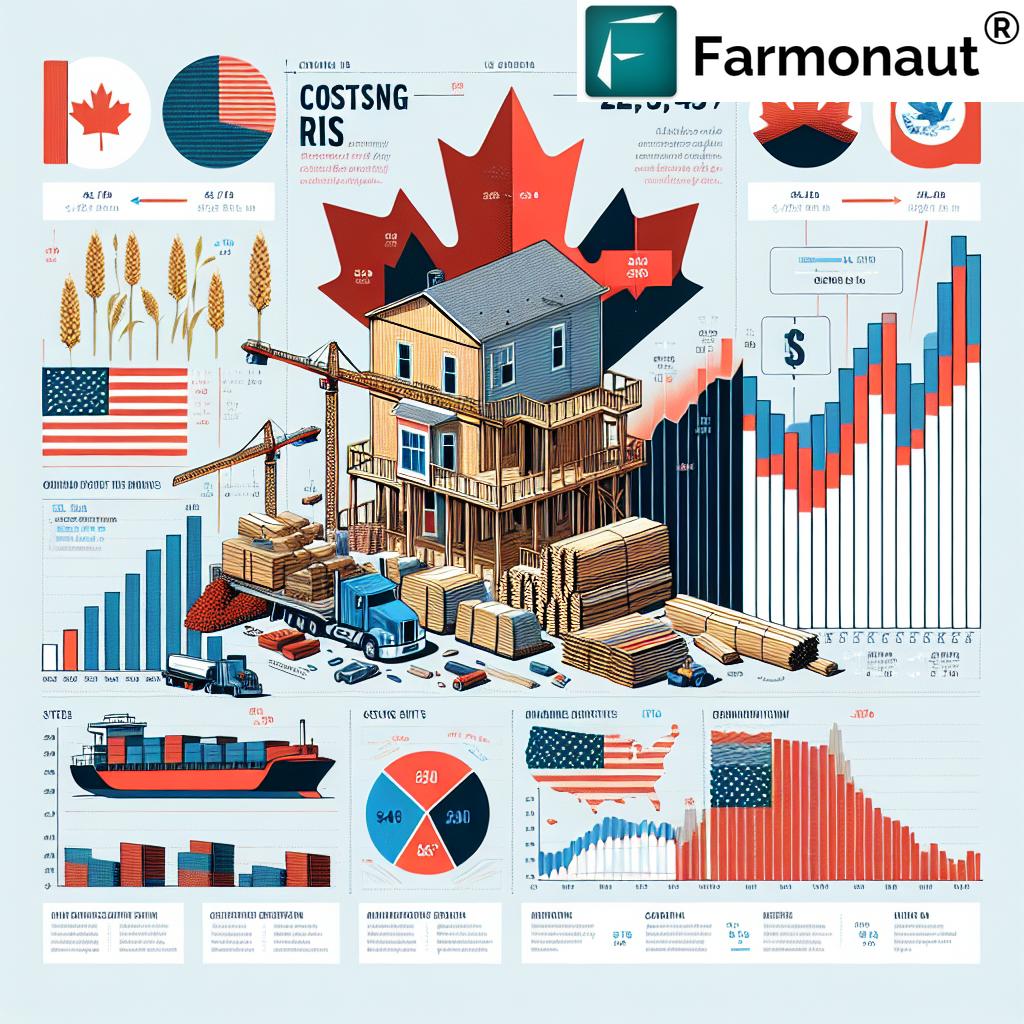Farmonaut Insight: US-Canada Trade Tariffs Impact on Agriculture and Construction – Economic Ripple Effects Across Borders
“New US-Canada trade tariffs could increase annual costs for Canadian households by $1,900.”
As representatives of Farmonaut, a leading agricultural technology company, we are deeply concerned about the recent developments in US-Canada trade relations and their potential impact on the agricultural sector. The escalating trade dispute between these two nations has far-reaching consequences that extend beyond borders, affecting various industries and economies on both sides.
In this comprehensive analysis, we will explore the intricate web of economic repercussions stemming from the newly imposed tariffs, with a particular focus on the agricultural and construction sectors. Our goal is to provide valuable insights into how these trade measures could reshape North American commerce and influence global competitiveness.
Understanding the US-Canada Trade Tariff Situation
The announcement of significant tariffs by U.S. President Donald Trump on Canadian goods has sent shockwaves through business associations in both Canada and the U.S., highlighting the deeply interconnected nature of their economies. Starting Tuesday, a 25% tariff will be imposed on Canadian products, along with a 10% tariff on Canadian energy.
In response to these measures, Canadian Prime Minister Justin Trudeau has announced retaliatory tariffs on $155 billion worth of American goods, set to begin on the same day. This tit-for-tat approach has raised concerns about the potential for a full-blown trade war between the two nations.

Impact on the Construction Industry
The construction sector is poised to be one of the hardest-hit industries by these new tariffs. The Residential Construction Council of Ontario has voiced strong criticism, stating that the tariffs threaten billions in trade related specifically to construction materials.
- Increased costs for building materials
- Potential slowdown in residential construction projects
- Exacerbation of the housing affordability crisis in Canada
Richard Lyall, president of the Council, emphasized that these impending tariffs could worsen the already challenging housing affordability crisis by increasing costs and slowing down residential construction. He noted that these new tariffs are more substantial than prior measures from the Trump administration regarding steel and aluminum.
Economic Implications for Canadian Households
The impact of these tariffs on Canadian households cannot be overstated. According to the Canadian Chamber of Commerce, led by president Candace Laing, a 25% tariff could impose an average annual cost of $1,900 on Canadian households. This significant increase in living expenses will undoubtedly affect communities and businesses alike.
At Farmonaut, we understand the importance of managing agricultural resources efficiently, especially in times of economic uncertainty. Our satellite-based farm management solutions can help farmers optimize their operations and potentially mitigate some of the financial pressures caused by these tariffs.
Disruption of Supply Chains and Increased Costs
One of the most significant concerns raised by business leaders on both sides of the border is the potential disruption of supply chains. John Murphy, senior vice president of the U.S. Chamber of Commerce, described the tariffs as unprecedented moves that will disrupt supply chains and increase costs for American families.
This disruption could have far-reaching consequences, affecting various industries beyond just construction and agriculture. The interconnected nature of modern global commerce means that even small changes in trade policies can have ripple effects throughout entire economic ecosystems.
Agricultural Sector Concerns
The agricultural sector has voiced particular concerns regarding the impact of the tariffs. The Canadian Federation of Agriculture, representing over 190,000 family farms, stressed that tariffs would have adverse effects on the critical trade relationships between Canadian and American farmers, ultimately benefiting global competitors.
- Potential reduction in agricultural exports
- Increased costs for farmers on both sides of the border
- Disruption of established trade patterns for products like canola and oil
Keith Currie, president of the CFA, underscored that no party wins in a trade dispute, which he deemed “bad business.” This sentiment echoes throughout the agricultural community, highlighting the importance of maintaining stable trade relations for the benefit of farmers in both countries.
“The US-Canada trade dispute impacts multiple sectors, including agriculture, forestry, and construction, affecting cross-border supply chains.”
Farmonaut’s Role in Navigating Agricultural Challenges
In these turbulent times, Farmonaut’s advanced agricultural technology solutions become even more crucial. Our platform offers real-time crop health monitoring, AI-based advisory systems, and resource management tools that can help farmers adapt to changing market conditions and optimize their operations.
By leveraging our satellite-based technology, farmers can make data-driven decisions to improve crop yields and reduce input costs, potentially offsetting some of the financial pressures caused by the tariffs. Our Jeevn AI Advisory System provides personalized farm advice, helping farmers navigate these challenging economic conditions more effectively.
Explore Farmonaut’s API for advanced agricultural data
Impact on Forestry and Natural Resources
The forestry sector is another area that stands to be significantly affected by these trade measures. Derek Nighbor, CEO of the Forest Products Association of Canada, remarked that the tariffs would not only harm Canadian industries but would also complicate recovery efforts in the U.S., particularly following recent natural disasters.
He emphasized that the U.S. is unable to meet all of its domestic needs and that the tariffs would exacerbate challenges related to affordable housing and disaster recovery. This highlights the complex interdependencies between the two countries’ economies, particularly in sectors reliant on natural resources.

Retaliatory Measures and Their Implications
In response to the U.S. tariffs, the Canadian government plans to implement retaliatory tariffs covering a wide array of American products. The first phase involves $30 billion worth of products, with an additional group valued at $125 billion to follow.
- Alcohol and furniture
- Natural resources
- Consumer goods
- Passenger vehicles
- Steel and aluminum
- Various agricultural products
These retaliatory measures are designed to put pressure on the U.S. economy and potentially bring both parties back to the negotiating table. However, they also risk escalating the trade dispute further, potentially leading to more significant economic consequences for both nations.
The Role of Technology in Mitigating Trade Challenges
At Farmonaut, we believe that technology can play a crucial role in helping farmers and agribusinesses navigate the challenges posed by these trade tariffs. Our advanced satellite-based solutions provide valuable insights that can help optimize agricultural operations and improve resilience in the face of economic uncertainties.
For instance, our precision agriculture tools can help farmers reduce input costs and improve crop yields, potentially offsetting some of the financial pressures caused by the tariffs. Additionally, our blockchain-based traceability solutions can help ensure transparency in supply chains, which may become increasingly important as trade relationships become more complex.
Access our API Developer Docs for integration with your systems
Cross-Border Trade and Economic Interdependence
The current trade dispute underscores the deep economic interdependence between the United States and Canada. With billions of dollars in goods crossing the border daily, any disruption to this flow can have significant ramifications for businesses and consumers on both sides.
Key areas of concern include:
- Disruption of integrated supply chains
- Increased costs for consumers
- Potential job losses in affected industries
- Reduced competitiveness in global markets
It’s crucial to recognize that in today’s globalized economy, trade disputes rarely have clear winners. Instead, they often result in mutual economic harm and can lead to long-term damage to established trade relationships.
Impact on Energy Sector
The 10% tariff on Canadian energy imports is another significant aspect of this trade dispute. Canada is a major supplier of oil and other energy products to the United States, and this tariff could have far-reaching effects on the energy sector in both countries.
Potential consequences include:
- Increased energy costs for U.S. consumers
- Reduced competitiveness for Canadian energy producers
- Disruption of established energy trade patterns
- Potential shift in global energy markets
This aspect of the trade dispute highlights the complex nature of US-Canada economic relations, where policy decisions in one sector can have ripple effects across multiple industries and regions.
Regional Economic Impact
The impact of these tariffs is likely to be felt differently across various regions of Canada. For instance, provinces with a strong focus on natural resources and manufacturing, such as Ontario, may be particularly affected. Similarly, agricultural regions that rely heavily on exports to the U.S. market could face significant challenges.
Cities like Edmonton, with its diverse economic base including energy, manufacturing, and agriculture, may experience the effects of the tariffs across multiple sectors. This regional variation in impact underscores the need for targeted support and adaptive strategies at the local level.
Global Competitiveness Concerns
Beyond the immediate bilateral effects, there are concerns about how these trade tensions might affect the global competitiveness of both Canadian and American industries. In an increasingly interconnected global economy, disruptions to established trade patterns can have far-reaching consequences.
For example:
- Increased costs may make North American products less competitive in global markets
- Uncertainty in trade relations could deter foreign investment
- Other countries may seek to fill market gaps created by the trade dispute
At Farmonaut, we recognize the importance of maintaining global competitiveness in the agricultural sector. Our advanced technologies can help farmers and agribusinesses optimize their operations and adapt to changing market conditions, potentially mitigating some of the challenges posed by these trade tensions.
Long-Term Economic Implications
While the immediate focus is on the short-term impacts of these tariffs, it’s crucial to consider the potential long-term implications for both economies. Prolonged trade tensions could lead to:
- Structural changes in affected industries
- Shifts in investment patterns
- Alterations to supply chain strategies
- Changes in consumer behavior and prices
These long-term effects could reshape economic landscapes on both sides of the border, potentially altering the nature of US-Canada economic relations for years to come.
The Role of Technology in Adapting to Trade Challenges
In the face of these economic challenges, technology can play a crucial role in helping businesses adapt and remain competitive. At Farmonaut, we’re committed to providing cutting-edge solutions that can help the agricultural sector navigate these uncertain times.
Our advanced satellite-based crop monitoring and AI-driven advisory systems can help farmers:
- Optimize resource use to reduce costs
- Improve crop yields to maintain profitability
- Make data-driven decisions in response to market changes
- Enhance overall farm efficiency and sustainability
By leveraging these technologies, farmers and agribusinesses can potentially mitigate some of the negative impacts of the trade tariffs and position themselves for long-term success.
Impact of US-Canada Trade Tariffs on Key Sectors
| Sector | US Impact | Canada Impact | Estimated Annual Cost to Canadian Households |
|---|---|---|---|
| Agriculture | Medium | High | $500 |
| Construction | Medium | High | $700 |
| Forestry | Low | High | $300 |
| Manufacturing | Medium | Medium | $400 |
| Total | – | – | $1,900 |
Conclusion: Navigating Uncertain Economic Waters
The imposition of trade tariffs between the United States and Canada represents a significant challenge for businesses and consumers on both sides of the border. The potential for increased costs, disrupted supply chains, and altered trade patterns creates a complex economic landscape that will require careful navigation.
As we at Farmonaut continue to monitor these developments, we remain committed to providing innovative solutions that can help the agricultural sector adapt to these changing economic conditions. Our advanced technologies offer tools for optimization, efficiency, and data-driven decision-making that can be invaluable in times of economic uncertainty.
While the full impact of these tariffs remains to be seen, it’s clear that businesses, particularly in the agriculture and construction sectors, will need to be proactive in adapting to these new economic realities. By leveraging technology, fostering innovation, and maintaining a focus on efficiency and sustainability, it’s possible to mitigate some of the negative impacts and potentially emerge stronger from this period of economic turbulence.
As we move forward, continued dialogue between governments, industry leaders, and stakeholders will be crucial in finding solutions that can preserve the strong economic ties between the United States and Canada while addressing the concerns that have led to these trade measures.
FAQ Section
Q: How will the US-Canada trade tariffs affect the average Canadian household?
A: According to estimates, the new tariffs could increase annual costs for Canadian households by approximately $1,900.
Q: Which sectors are most affected by these trade tariffs?
A: The sectors most significantly impacted include agriculture, construction, forestry, and manufacturing.
Q: How might these tariffs affect housing affordability in Canada?
A: The tariffs are expected to increase construction costs, potentially exacerbating the existing housing affordability crisis in Canada.
Q: What retaliatory measures has Canada announced?
A: Canada has announced retaliatory tariffs on $155 billion worth of American goods, including a wide range of products from alcohol to natural resources.
Q: How can technology help farmers navigate these economic challenges?
A: Advanced agricultural technologies, like those offered by Farmonaut, can help farmers optimize their operations, reduce costs, and make data-driven decisions to maintain profitability in challenging economic conditions.
Earn With Farmonaut
Earn 20% recurring commission with Farmonaut’s affiliate program by sharing your promo code and helping farmers save 10%. Onboard 10 Elite farmers monthly to earn a minimum of $148,000 annually—start now and grow your income!
Farmonaut Subscriptions
















